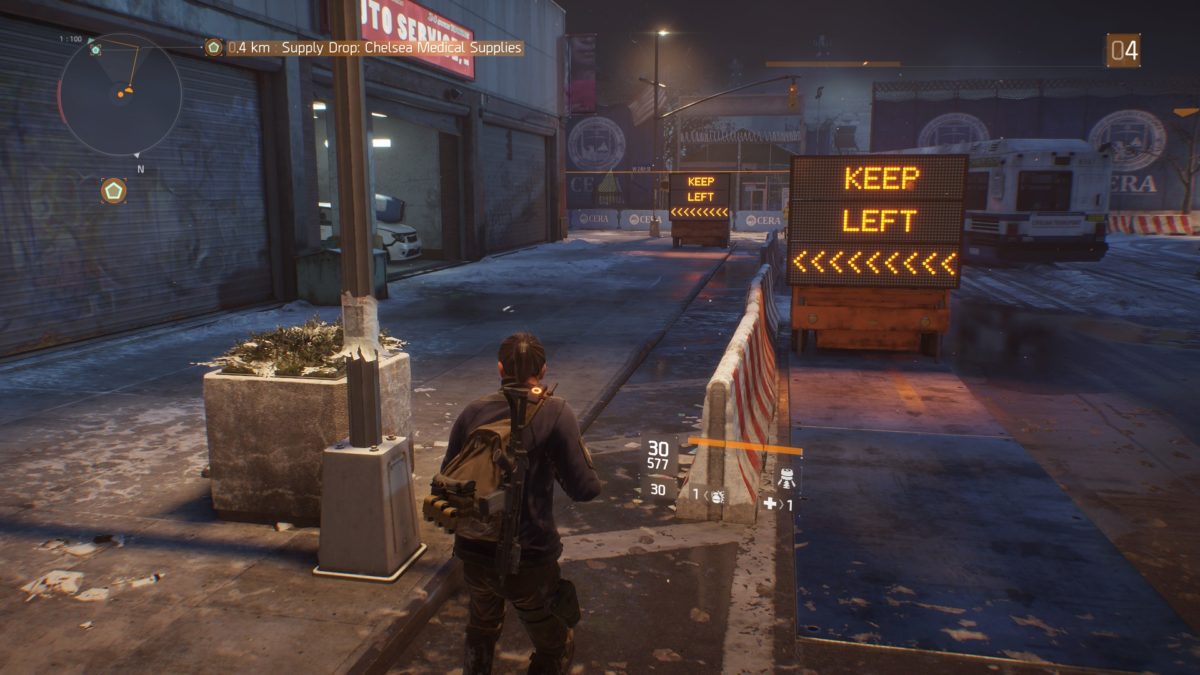Scene One.
The Division base campaign is free on Xbox Game Pass. I have never played the game. I don’t know what it’s like. Never even seen a trailer for it. So I sacrifice my other live-service time-suck, Destiny 2, to download it.
Have you ever seen the Division trailer? The entire backstory and premise is baked into its four minutes, and honestly it’s probably better than the entire rest of the game. You see the silhouettes of normal New Yorkers dealing with the crushing effects of a smallpox-like plague. Cars crash in the Brooklyn streets. A dense blanket of snow coats everything as rapid decay sets in.
As the trailer ends, to signify that help has arrived, people suddenly appear where before they were invisible, merely indentations in the snow. A hand reaches down to pull a civilian up. The Division is here baybay. They’re a secret task force of seemingly everyday folks like you or me, and they’re the best of the best of the best, sir. With honors. The best part? They’re only activated in times of extreme need, which this clearly is.
The Division is a bleak game in terms of its tone, color palette and outlook. Of course everyone is a looter or a criminal when you believe the only way to help in a crisis situation is through martial law and an unaccountable paramilitary force made up of hipsters from Brooklyn. History knows differently. Groups like Common Ground Collective in New Orleans after Hurricane Katrina, and Occupy Sandy in New York after Hurricane Sandy, plainly demonstrated the power of actual everyday people when the government failed to help.
There’s something sinister about playing an agent of the Division. I raised my weapon on accident early on, trying to get acclimated to the control scheme, and people would run from me. The game plays like garbage, but honestly I don’t know if I want it to play like a Destiny. The dark allure of becoming an unstoppable murderer with state sanction is terrifying.
Scene Two.
There’s a short film on YouTube called Uncanny Valley. It imagines a world in which virtual reality technology has advanced so far that all you need to escape our world is a tiny fake nose ring that will hang you in suspended animation. VR “junkies” are portrayed as antisocial experience fiends, misanthropes and criminals beyond the reach of limited mental health resources.
One VR junkie escapes the fantasy world he’s immersed in accidentally and realizes what he’s actually doing. This marks him to suffer a fate he’s unwittingly dealt out to dozens, maybe hundreds.
Drone operators in the US military have compared their job to playing video games. Psychological studies have shown that gamers may be just as good as professional drone operators at flying Predators. Activision-Blizzard has a cozy relationship with the US military through the Call of Duty Foundation, but its last game, Call of Duty: Modern Warfare, “isn’t political.”
Scene Three.
A professor posts a meme on Twitter, Mario in a lab coat pointing at a chalkboard: “There are no apolitical games.” Lots of people retweet and like the post, but a small group of very upset gamers finds the post and try responding with refutations. Folks patiently explained why each supposed refutation was political, and gamers got so upset that they started sending death threats to the professor. Less than 12 hours later, the professor took the post down.
“We live in a society.”
Video games do not exist in a vacuum. They are not made by ghosts. If it upsets you that games are not an escapist, blithely consumerist hobby with absolutely no connection to politics, consider that nothing we do is free of the choices of others.
“I type on this computer, knowing that some hands suffered to make it, but not knowing which hands,” Grace in the Machine writes. “I eat, not knowing who picked this fruit, who grew this grain, whose truck carried it from far away.”
“The videogame is a quirk of capitalist design and industry, reliant so thoroughly, from the most minimalist revolutionary thought experiment on itch.io to the most boisterously gun-ho manshooter on the PlayStation Store, on infrastructures and technology that demand the ceaseless and violent consumption of so many natural resources whose complete annihilation by this process my, ‘millennial,’ generation will likely see within our lifetime,” Tara Hillegeist writes for Bullet Points Monthly. “The videogame will not be salvageable.”
“There is no real incentive for the world to pay attention to video games,” Joshua Rivera wrote in his last post at Kotaku last week. “In my opinion, this is bullshit. That does not make it untrue. But there are consequences for ignoring video games.”
Scene Four.
A Bewitching Revolution is a 2019 game by Colestia. In it, you play a witch who walks around a small neighborhood nestled in a large futuristic city, sowing the seeds of revolution. You spread polemic to new comrades through tarot readings. You brew Molotov cocktails in a potion-making cauldron. You guide magic acorns to cracks in the concrete, where they grow into towering trees.
You are not the leader of the revolution. The dystopic hellscape your little neighborhood is ensconced in might think so, but your role is firmly in the background. You help the homeless person with a knack for spreading the news find a squat to live in and produce their newsletter. You suggest to the fast-food workers that unionizing would mean a better life for them – they extend that to helping to feed the neighborhood for free. You never throw a Molotov, but the ones that get thrown help free prisoners and topple state control.
The neighborhood threw the revolution.
A review of A Bewitching Revolution was “disappointed that it uses tarot.”
Follow us on Twitter, Instagram and Facebook. If you want to support No Escape with dollars I guess, check out our Patreon!
